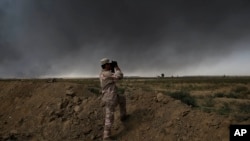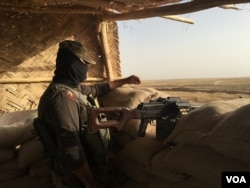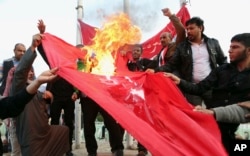With the long-awaited military assault on Mosul possibly just days away, U.S. officials are scrambling to resolve flaring disputes between allies in the coalition to liberate Iraq’s second largest city, the Islamic State’s last major urban stronghold in Iraq.
For weeks, the assault has been expected and had appeared imminent with coalition radio broadcasts and leaflets warning civilians in Mosul and identifying exit routes they can use to flee. But simmering disagreements between coalition allies appear to be worsening, especially over how the greater Mosul region of Nineveh will be governed after liberation and who should be involved in the fight to eject IS.
Kurdistan Regional Government Prime Minister Nechirvan Barzani warned Sunday of future problems unless there is an agreement with Baghdad on how to share power in Nineveh. “We should not forget that the case of Mosul is more political than military,” Barzani told at an economic conference in Irbil.
“All the political and religious components should have deserved roles in the political process and determination of the future of the region and how they want to be governed,” he added. Nineveh contains territory that has long been disputed between the Kurds and Arabs.
Barzani acknowledged military preparations are in place for the offensive to begin on Mosul, echoing remarks Friday in Washington by Brett McGurk, the State Department’s envoy to the anti-IS coalition, who said “all the pieces” had been prepared for the assault. McGurk said he expected military operations are “rapidly approaching.”
Arab-Kurdish disputes have flared and then receded for months now. In August, McGurk engaged in shuttle diplomacy between Irbil and Baghdad to defuse tensions and mediate an oil revenue-sharing deal between the Kurds and Arabs, who had been quarreling for months over Kurdistan’s export revenues.
That deal advanced negotiations between the Kurds and Baghdad on the composition of forces for the offensive on Mosul. U.S. officials say the Kurds agreed not to enter the Sunni-Arab city during the assault and to allow the Iraqi Security Forces to use territory now controlled by the peshmerga to the east and north of the city.
But since that deal was struck, sectarian disputes have continued to plague pre-battle planning, concede U.S. officials who spoke on the condition of anonymity.
They say they have been frustrated by a series of public comments in the past week by Kurdish leaders that appeared designed to offend the Shi’ite-dominated government in Baghdad. Thursday, Iraqis were infuriated when the Kurdistan Regional Government’s top security official told Britain’s Sky News the peshmerga will keep any land they seize from the terror group and will consider captured territory part of Kurdistan.
And the KRG has been lobbying Sunni tribal chiefs in Nineveh to express their support for an independent Kurdish state and to say they want their towns included in the Kurdistan region.
Sheikh Ali Rekan, a leader of an al-Shammar tribal clan in the town of Rabia, west of Mosul, told Kurdish television Friday, “We have decided to be part of the Kurdistan Region, and we support Kurdish independence. We will never compromise on our decision.” He added, “Thousands of peshmerga soldiers have sacrificed their lives in freeing our areas. Therefore, we must be sincere to them.”
KRG officials say they will go ahead with a planned referendum on independence by the end of the year.
None of the maneuvering is helping U.S. officials to keep the political parts in place for the assault on Mosul. McGurk remarked Friday that “if we try to resolve everything before Mosul, Daesh (IS) will never get out of Mosul.” Other U.S. officials, though, argue more work needs to be done to resolve disputes between allies.
There also are questions how local Sunni Arabs will react to the Iraqi Security Forces, which are dominated by Shi’ites. Iraqi officials have agreed that irregular Shi’ite militias known as the Popular Mobilization will not enter the city or if they do, they won’t stay long. Turkey sees any involvement by the Iran-influenced militias as boosting Tehran’s clout in northern Iraq, a red line as far as Ankara and Saudi Arabia are concerned.
Ankara has repeatedly rejected Baghdad's demands it withdraw its forces from the Bashiqa military camp in northern Iraq and has warned against the irregular Shi’ite militias playing any role. It insists that nearly 3,000 Sunni fighters it has trained at the camp 25 kilometers northeast of Mosul must play a major part in the coming campaign.
Abdelaziz Hasan, a prominent Iraqi lawmaker and member of the parliament defense committee, said Saturday the offensive to retake Mosul won’t begin while Turkish troops remain on Iraqi soil.
“I think that as long as these Turkish troops remain around Mosul, the operation to control the city will not start, or there must be a new agreement for the Turkish force not to take part in the offensive,” he said.
He warned a sectarian war between Shi’ite and Sunni militias in Nineveh was in the offing if Turkey involved itself in the Mosul offensive. Turkey has waxed and waned about whether it will participate. Turkey has deployed about 2,000 “military advisers” at the camp to help train local Sunni fighters in a militia called Hashd al-Watani.
An Ankara official told Turkey’s Hurriyet newspaper Sunday talks about Turkey’s role in the Mosul campaign are ongoing. In an interview earlier this month with Rotana TV, Turkey’s President Recep Tayyip Erdoğan said, “I want to make it clear that Turkey, Saudi Arabia, Qatar and the Western coalition will not allow sectarian domination (of Mosul). But there is a major question, who will then control the city? Of course, Sunni Arabs, Sunni Turkmen and Sunni Kurds.”












